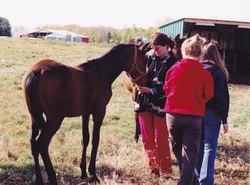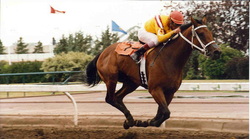
This experiential nature of interacting with Thoroughbred horses on a large breeding farm in Alberta encourages self- awareness, self- regulation and personal reflection for children and youth.
Dr. Brenda E. Abbey's counselling experience and research indicates that Equine Facilitated Learning increases the child/ youth client's awareness of their own emotional state and non -verbal body language based on recognizing the horse's reactions during the interaction time in the pasture or private paddock. This type of experiential learning with horses has proven very effective as a positive intervention for children with ADD/ADHD . Even very young foals will react and provide a MIRROR for the client.
Dr. Brenda E. Abbey has written an article on Healing with Horses as well as another Research Paper about How Equine- Assisted Learning Repatterns the Limbic System in children's brains { based on her own Applied research in this area}.

 RSS Feed
RSS Feed
